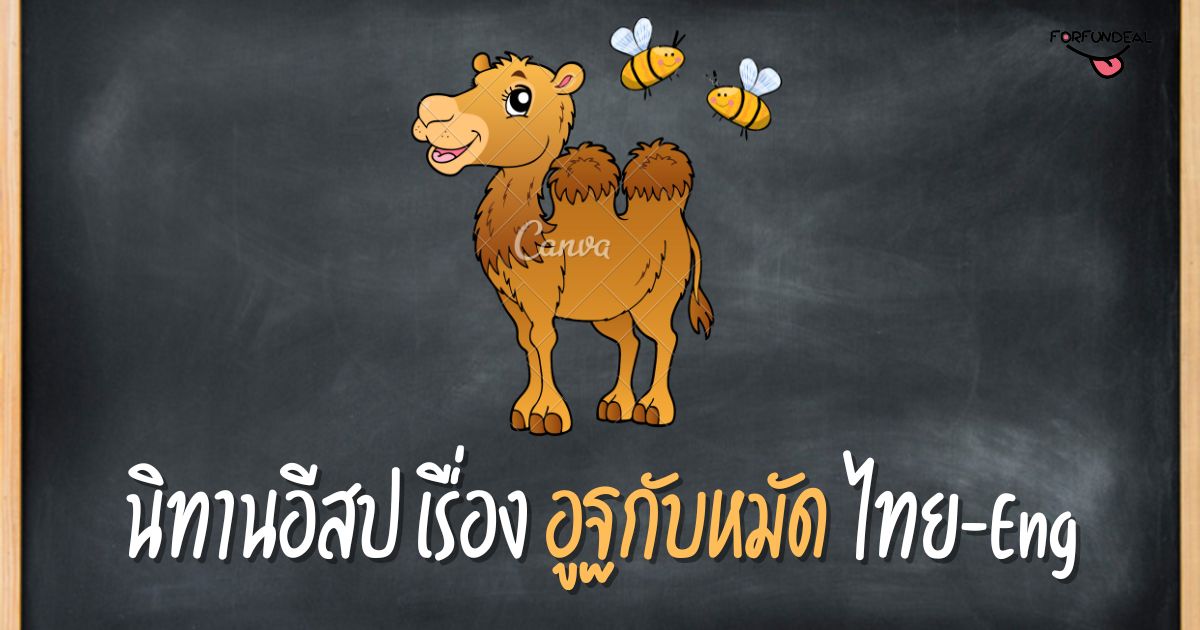“อูฐกับหมัด” เป็นนิทานอีสปที่สอนเราถึงการยกยอตัวเอง และโอ้อวดโดยปราศจากการกระทำที่แท้จริงนำมาซึ่งการสูญเสียความเคารพต่อผู้อื่น และจงพึงคำพูดเสมอ
นิทานอีสปเรื่องอูฐกับหมัด
กาลครั้งหนึ่งนานมาแล้ว ในทะเลทรายอันกว้างใหญ่ มีหมัดตัวเล็กๆ อยู่บนหลังอูฐตัวใหญ่ ขณะที่อูฐเดินทางข้ามเนินทราย หมัดก็เกาะติดอยู่ และได้สัมผัสกับโลกที่เหนือจินตนาการของมัน ก้าวอันทรงพลังของอูฐพาพวกมันไปได้ไกล แต่การเดินทางนั้นยาวนานและลำบาก
Once upon a time, In a vast desert, a tiny flea found itself atop the back of a great camel. As the camel journeyed across the dunes, the flea clung on, experiencing a world beyond its imagination. The camel’s powerful strides carried them far, but the journey was long and arduous.
เมื่อการเดินทางของอูฐใกล้จะสิ้นสุด หมัดก็ตัดสินใจกระโดดออกไป ให้เหตุผลว่าไม่ต้องการเป็นภาระแก่อูฐอีกต่อไปเมื่อพิจารณาจากขนาดที่เล็กของมัน อูฐหันหน้ามาถามว่า “นี่เจ้าขี่หลังข้ามาตลอดเหรอ?”
As the camel’s journey approached its end, the flea decided to leap off. It reasoned that it didn’t want to burden the camel any further, considering its small size. The camel turned its head and inquired, “Were you riding on my back all this time?”
หมัดตอบว่า “ใช่แล้ว อูฐที่รัก ข้าเลือกที่จะกระโดดบนหลังของเจ้าเพื่อไปยังดินแดนใหม่นี้ แต่ข้าเข้าใจว่าการปรากฏตัวของข้าอาจเพิ่มความพยายามของเจ้า” มันอธิบายให้อูฐฟังว่าไม่ต้องการเป็นภาระหรือทำให้อูฐเหนื่อยอีกต่อไป
The flea responded, “Yes, dear camel. I chose to hop on your back to reach this new land, but I understand that my presence might have added to your efforts.” It explained to the camel that it didn’t want to burden or tire the camel any further.
อูฐหัวเราะเบาๆ และแบ่งปันความเข้าใจ “หมัดตัวน้อย ฉันไม่รู้ว่าคุณปรากฏตัวตลอดการเดินทางครั้งนี้ เห็นไหมว่าคำอวดอ้างของเจ้าในการเป็นเพื่อนที่คู่ควรยังไม่เข้าหูข้าจนถึงบัดนี้”
The camel chuckled softly and shared its insight, “Little flea, I was unaware of your presence throughout this journey. You see, your boastful claims of being a worthy companion didn’t reach my ears until now.”
และอูฐกล่าวด้วยน้ำเสียงที่ไพเราะว่า “บรรดาผู้โอ้อวดสถานะอันสูงส่งโดยไม่ได้มีความสำคัญอย่างแท้จริง จะสูญเสียความเคารพเมื่อความจริงถูกเปิดเผย”
With a hint of wisdom in its voice, the camel remarked, “Those who boast of lofty status when they hold no real significance lose respect when the truth is revealed.”

นิทานเรื่องนี้สอนให้รู้ว่า
“การโอ้อวดโดยปราศจากการกระทำจริงเพื่อสนับสนุนอาจนำไปสู่การสูญเสียความน่าเชื่อถือและความเคารพ จงให้ความสำคัญของความอ่อนน้อมถ่อมตนและความซื่อสัตย์”
- ความอ่อนน้อมถ่อมตนและการโอ้อวด: เรื่องราวเตือนเราว่าการโอ้อวดโดยไม่มีเนื้อหาอาจนำไปสู่การสูญเสียความน่าเชื่อถือและความเคารพ ซึ่งจะเห็นได้ชัดเมื่อการกระทำของคนไม่ตรงกับคำพูด
- การกระทำสำคัญกว่าคำพูด: การที่อูฐไม่ตระหนักถึงการปรากฏตัวของหมัด เน้นย้ำว่าการกระทำมีน้ำหนักมากกว่าคำพูดเพียงอย่างเดียว สิ่งสำคัญคือต้องสนับสนุนการเรียกร้องของเราด้วยพฤติกรรมที่สอดคล้องกัน
- ความมีค่าควรที่แท้จริง: นิทานสอนว่าความมีค่าควรและความสำคัญนั้นแสดงให้เห็นผ่านการกระทำและการมีส่วนร่วมของเรา ไม่ใช่การกล่าวอ้างที่ว่างเปล่าหรือการยกย่องตนเอง
- ความสุภาพและความเคารพ: ความสุภาพเรียบร้อยและความอ่อนน้อมถ่อมตนเป็นคุณธรรมที่ได้รับความเคารพ ซึ่งตรงข้ามกับการเรียกร้องความสนใจหรือการยอมรับผ่านการกล่าวอ้างที่เกินจริง
- ผลกระทบของชื่อเสียง: ชื่อเสียงนั้นสร้างขึ้นจากวิธีที่เราปฏิบัติตนและปฏิบัติตามคำมั่นสัญญาของเรา การเผชิญหน้าของหมัดกับอูฐเน้นย้ำถึงความสำคัญของการรักษาชื่อเสียงที่น่าเชื่อถือ
- การทำความเข้าใจมุมมอง: มุมมองของอูฐให้ความกระจ่างเกี่ยวกับความสำคัญของการรู้ว่าเมื่อใดและอย่างไรในการสื่อสารความสามารถของเรา เพื่อให้แน่ใจว่าความสามารถเหล่านั้นมีพื้นฐานอยู่บนความเป็นจริง
“Boasting without true actions to support it can lead to loss of credibility and respect, Have to importance of humility and integrity.”
- Humility and Boasting: The story reminds us that boasting without substance can lead to loss of credibility and respect, as it becomes evident when one’s actions don’t match their words.
- Actions Speak Louder: The camel’s unawareness of the flea’s presence emphasizes that actions carry more weight than mere words. It’s important to back our claims with consistent behavior.
- True Worthiness: The tale teaches that worthiness and significance are demonstrated through our actions and contributions, rather than empty claims or self-aggrandizement.
- Modesty and Respect: Modesty and humility are virtues that garner respect, as opposed to seeking attention or recognition through exaggerated claims.
- The Impact of Reputation: Reputation is built on how we carry ourselves and fulfill our commitments. The flea’s encounter with the camel highlights the importance of maintaining a trustworthy reputation.
- Understanding Perspective: The camel’s perspective sheds light on the significance of knowing when and how to communicate our abilities, ensuring that they are grounded in reality.
โดยสรุปแล้วนิทานเรื่องนี้สอนเราว่าความมีค่าควรที่แท้จริงได้มาโดยการกระทำที่ถ่อมตัว และการโอ้อวดโดยปราศจากสาระสามารถนำไปสู่การถูกมองข้ามหรือแม้แต่ถูกเยาะเย้ยได้ โดยเน้นถึงคุณค่าของความสุภาพเรียบร้อย ความซื่อสัตย์ และความสำคัญของการใช้คำพูดให้สอดคล้องกับการกระทำของเรา

